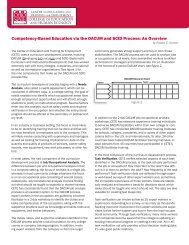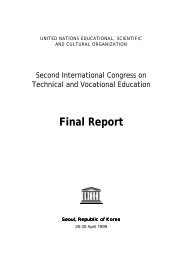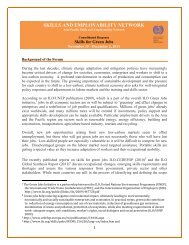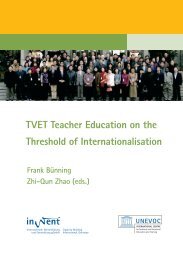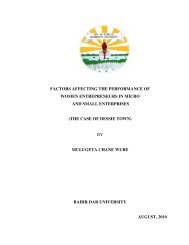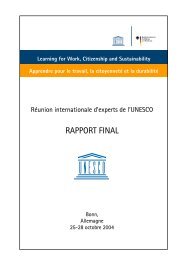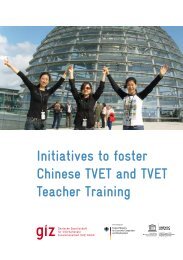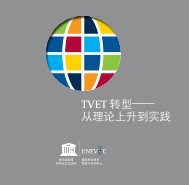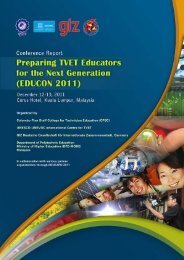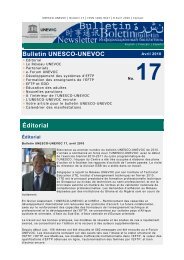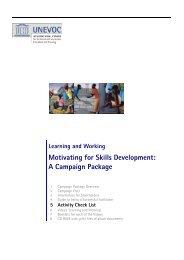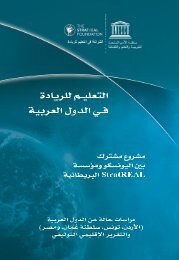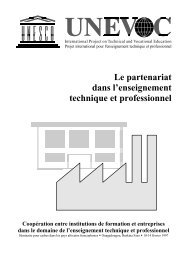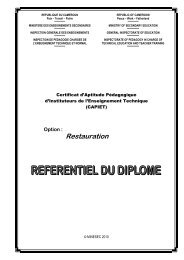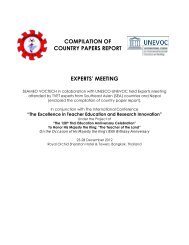Green TVET and Education for Sustainable ... - Unesco-Unevoc
Green TVET and Education for Sustainable ... - Unesco-Unevoc
Green TVET and Education for Sustainable ... - Unesco-Unevoc
You also want an ePaper? Increase the reach of your titles
YUMPU automatically turns print PDFs into web optimized ePapers that Google loves.
in the light of the actual circumstances, explore a path<br />
of sustainable growth through green <strong>TVET</strong> suited to<br />
their own conditions <strong>and</strong> development stages.<br />
Ms Naing introduced the implementation process of<br />
the UNESCO Strategy <strong>for</strong> the Second Half of the UN<br />
decade of <strong>Education</strong> <strong>for</strong> <strong>Sustainable</strong> Development<br />
<strong>and</strong> discussed the role of UNEVOC Networks<br />
with regard to signicance of regional networking.<br />
Dr. Klaus Dieter-Mertineit of the IUB Hanover<br />
meanwhile, discussed the several approaches to<br />
initiate <strong>and</strong> implement ecological sustainability in<br />
<strong>TVET</strong>. e last speaker, Dr. Klaus Jenewein of the<br />
University of Magdeburg <strong>and</strong> Dr. Klaus Hahne of<br />
the BiBB, Bonn tackled the overview on <strong>TVET</strong><br />
teacher training models <strong>and</strong> approaches to integrate<br />
sustainable development aspects.<br />
In summary, the midterm review discussed the<br />
following ndings on ESD;<br />
i. Awareness, Meaning <strong>and</strong> Scope of ESD should<br />
be encouraged to broaden the knowledge of the<br />
beneciaries<br />
ii. ere is a need to reorient the <strong>TVET</strong><br />
curriculum to comply with ESD practices is<br />
their respective systems<br />
iii. e promotion of capacity building on ESD<br />
should be prioritized<br />
iv. Need to develop ESD Resources <strong>and</strong> material as<br />
a reference <strong>and</strong> guide to the projects. e use of<br />
local languages in these ESD resource materials<br />
hinders the wide dissemination of in<strong>for</strong>mation<br />
<strong>and</strong> thus the sharing <strong>and</strong> application of best<br />
experiences of the countries involved.<br />
v. A need to boost networking <strong>and</strong> cooperation<br />
among the partner organizations<br />
vi. A need <strong>for</strong> further ESD related research to be<br />
used in the monitoring <strong>and</strong> evaluation of the<br />
programs <strong>and</strong> initiatives under ESD.<br />
FIELD VISITS<br />
On the aernoon of September 13, 2010, the<br />
participants went to the “Specialist Field Trip” to the<br />
Water Supply Facilities around Munich to observe<br />
<strong>and</strong> be familiarized with the ecient, world-class<br />
st<strong>and</strong>ards of German water purication <strong>and</strong> use. e<br />
participants visited the Groundwater Catchment<br />
Facility in Reisach where a demonstration of<br />
the mechanisms <strong>for</strong> retrieving groundwater was<br />
demonstrated. e Hillside Water Catchment facility<br />
showed the participants how water was harvested<br />
from the slopes of the hills. It also included a tour on<br />
the “Sprial Tower” alham.<br />
18 |<br />
International Experts Workshop on<br />
<strong>Green</strong> <strong>TVET</strong> <strong>and</strong> <strong>Education</strong> <strong>for</strong> <strong>Sustainable</strong> Development: Capacity Development Needs <strong>for</strong> Water <strong>Education</strong><br />
September 13-17, 2010 | Munich, Germany<br />
Multimedia presentations commenced aer the<br />
tour, which included an overview of the history<br />
of the three German Watersheds was presented<br />
by Mr. Max von Peenkofer. A short lm on the<br />
German Facilities <strong>for</strong> Water Catchment <strong>and</strong> Support<br />
Program <strong>for</strong> Ecological Farming was also shown to<br />
the participants. To wrap up the tour, the participants<br />
observed the Photo Gallery of the DWA regarding<br />
the Historical Progress of Water Supply <strong>for</strong> Munich.<br />
Another important visit was on the International<br />
Trade Fair <strong>for</strong> Water held at New Munich Trade Fair<br />
Center, where the participants observed some 2,700<br />
exhibits on advanced technologies <strong>and</strong> products on<br />
water resource procurement <strong>and</strong> conservation. is<br />
trade fair featured the modern ways of h<strong>and</strong>ling water<br />
<strong>and</strong> waste resources in the world. e event was<br />
recognized as a leading trade fair <strong>for</strong> environmental<br />
technology where the focus on water <strong>and</strong> waste<br />
largely seen as an important issue in this generation.<br />
CLOSING CEREMONY<br />
e nal leg of the symposium was held at Magdeburg<br />
on September 17, 2010. Dr. Majumdar, on his closing<br />
remarks, highlighted that a framework <strong>for</strong> green<br />
practices should be proposed to address the challenges<br />
concerning the <strong>Green</strong> <strong>TVET</strong> concept, He also urged<br />
every participant to adopt the green practices on<br />
<strong>TVET</strong> such as the promotion of a “<strong>Green</strong> Campus”<br />
which will instill a culture of sustainable development<br />
through “<strong>Green</strong> Research” <strong>and</strong> “<strong>Green</strong> Cultures”.<br />
Dr. Borhene Chakroun, Chief, Section <strong>for</strong> <strong>TVET</strong><br />
<strong>and</strong> Division <strong>for</strong> <strong>Education</strong> Strategies& Capacity<br />
Building, Paris meanwhile armed UNEVOC’s<br />
commitment in investing on continuous capacity<br />
building <strong>and</strong> building international partnerships <strong>and</strong><br />
alliances to <strong>for</strong>ward the cause.<br />
WAY FORWARD<br />
e 5-day meeting explored options to aain ESD<br />
practices in <strong>TVET</strong> <strong>and</strong> encourage the adoption<br />
of greener, more environment-friendly <strong>and</strong> more<br />
modern technologies <strong>for</strong> water conservation. e<br />
dierent approaches <strong>and</strong> themes with regards with<br />
ESD <strong>and</strong> Water Sustainability were tackled, focusing<br />
on these aspects:<br />
i. <strong>Green</strong>ing <strong>TVET</strong> in support of the ESD<br />
ii. <strong>TVET</strong> <strong>for</strong> Water Sustainability: Global <strong>and</strong><br />
Regional Network <strong>and</strong> Action<br />
iii. <strong>TVET</strong> <strong>and</strong> ESD: Approaches <strong>and</strong><br />
Implementation Schemes in eory <strong>and</strong> in<br />
Practice



